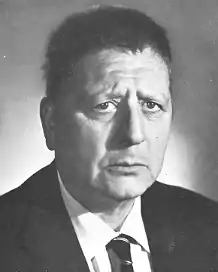Giorgio Amendola | |
|---|---|
 Amendola in 1972 | |
| Member of the Chamber of Deputies | |
| In office 25 June 1946 – 5 June 1980 | |
| Personal details | |
| Born | 21 November 1907 Rome, Italy |
| Died | 5 June 1980 (aged 72) Rome, Italy |
| Political party | PCI (1929–1980) |
| Spouse | Germaine Lecocq |
| Relatives | Giovanni Amendola (father), Eva Kühn (mother) |
| Occupation | Politician, journalist |
Giorgio Amendola (21 November 1907 – 5 June 1980) was an Italian writer and politician.[1] He is regarded and often cited as one of the main precursors of the Olive Tree.[2] Born in Rome in 1907, Amendola was the son of Lithuanian intellectual Eva Kühn and Giovanni Amendola, a liberal anti-fascist who died in 1926 in Cannes after having been attacked by killers hired by Benito Mussolini. He secretly joined the Italian Communist Party (PCI) in 1929. After graduating in law, he started to propagandize opposition to the Mussolini regime.
Arrested and brought in exile in France, and successively banished to Santo Stefano Island in the Pontine Islands, Amendola was freed in 1943 by the resistance troops, which he then joined. After World War II, he served as a deputy in the Italian Parliament for the PCI from 1948 until his death in 1980. He became known especially in the 1970s as one of the leaders of the party's right wing, which espoused gradual removal of the ideas of Soviet Communism and Leninism, and supported alliances with the more moderate parties, especially the Italian Socialist Party, a concept later called Eurocommunism. One of his main allies was Giorgio Napolitano, a member of the Chamber of Deputies who became President of Italy (2006–2015) and remains an avowed disciple and follower of Amendola.
From 1967 onwards, Amendola started to work as a writer; his most notable books include Comunismo, antifascismo e Resistenza ("Communism, Anti-Fascism and Resistance", 1967), Lettere a Milano ("Letters to Milan", 1973), Intervista sull'antifascismo[3] ("Interview on Anti-Fascism", 1976, with Piero Melograni), Una scelta di vita[4] ("A Choice of Life", 1978), and Un'isola ("An Island", 1980), which is considered to be his best work. Amendola died in Rome, aged 72, after a long illness. His wife Germaine Lecocq, whom he met during his French exile in Paris and who helped him to write his last work, died a few hours after Amendola.
References
- ↑ Bosworth, R. J. B. (2023). Politics, Murder and Love in an Italian Family: The Amendolas in the Age of Totalitarianisms. Cambridge University Press. ISBN 978-1-009-28017-4.
- ↑ "Massimo D'Alema on Amendola". YouTube. 2012-06-05. Archived from the original on 2021-12-14.
- ↑ Amendola, Giorgio (1976). Intervista sull'antifascismo (in Italian). Laterza. ISBN 88-420-4487-3.
- ↑ Amendola, Giorgio (1978). Una scelta di vita (in Italian). Rizzoli. ISBN 88-17-12610-1.
Bibliography
- Bosworth, R. J. B. (13 January 2023). Politics, Murder and Love in an Italian Family: The Amendolas in the Age of Totalitarianisms. Cambridge: Cambridge University Press. ISBN 978-1-0092-8016-7. Retrieved 5 July 2023 – via Google Books.